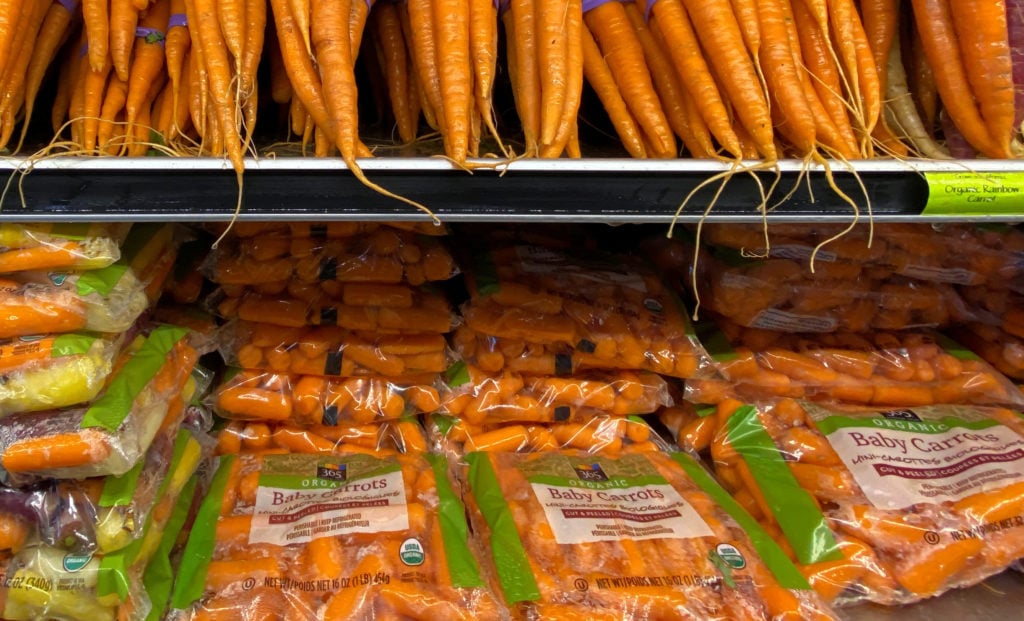Summary
An E. coli outbreak linked to bagged organic carrots from Grimmway Farms has infected 39 people across 18 states, with 15 hospitalized and one death reported.
The recalled carrots, sold under brands like Trader Joe’s, Wegmans, and 365, are no longer in stores, but the CDC urges consumers to check for and discard any remaining stock.
E. coli infections, which cause severe stomach cramps, bloody diarrhea, and vomiting, can be life-threatening for vulnerable groups.
Recent outbreaks have also been tied to onions, lettuce, and walnuts.
This type of stuff is only going to get worse in the next four years.
Absolutely. These companies need oversight.
Good. The American people wanted this. Unregulated and unceasing capitalism will surely not kill thousands.
A thin majority of the Americans who voted wanted this.
75m Americans voted for this. Many millions more sat on their hands. It’s our reality now and no one to blame but ourselves
The current totals are 76M for trump and 74M for Harris.
You’re not wrong in that more people should have turned out, but lots and lots of people did not want this.
LoL! I’m a Pro Life Republican and January can’t come SOON ENOUGH! Once Trump is in Office I won’t have to HEAR about ANY of this (even though it’ll be Happening MORE Frequently because of Lack of Regulations! I just won’t HEAR about it because it’ll be ILLEGAL to Mention!)!
The power of deregulation is literally killing people.
This has nothing to do with deregulation. If it did, they wouldn’t be removing contaminated carrots and you would never have heard of this.
Those “non-existent regulations” are what forced the recall.
Next time this happens under RFK’s tenure as secretary of HHS, there won’t be a recall. There wouldn’t even be a warning. They’ll just stay on shelves, hospitalizing and killing even more people.
Ugh, talk about a bad way to go. I once got food poisoning that needed a trip to the hospital, which is what ecoli is. I needed 2 units of water. Fortunately I’m not at risk so it cleared up fine with some antibiotics. But sitting yourself to death, while it sounds funny, is actually kinda awful.
Stomach pain can be easily some of the worst pain.
This is going to become more & more common once trump takes over.
The recalled organic baby carrots have best-by dates ranging from Sept. 11 through Nov. 12,
This article wasn’t posted until November 17. I guess it’s still helpful, but pre-packed baby carrots tend to get slimy after the best by date.
Dang I just bought some onions.
that is ok, you will forget all about these once they start selling raw milk without any control
Well, they were organic alright. All natural shit fertilizer.
“Well, they were organic alright. All natural shit fertilizer.”
Doesn’t work that way. Even if the fields were fertilized with manure, they are done so long before planting - it’s literally in the National Organic Program regulations that certified organic farms are required to follow. It’s also just common practice anyway. Because duh, root vegetables.
The main and pretty much only source of contamination is in the harvesting, processing, and handling. Not just people but equipment like conveyor belts. For example, “baby carrots” are almost never grown small but big carrots cut up by machines, which -no surprise- are easily contaminated.
Y’all know those migrants who pick your produce can’t afford to leave the big fields to use the bathroom so they let it fly in the fields - enjoy.
Already blaming immigrants and shifting away from the real issue at hand. After Trump is installed, you will see more of these contaminations or not, because probably it will be forbidden to report them
Already blaming immigrants
A complete lack of understanding is apparent. How is it “blaming immigrants” when the system is set up that way? The owners pay pennies for each container the workers harvest. Workers can’t afford to lose pay by going to the far off toilets and the bosses know that.
It’s not surprising to me that people are misinterpreting your comment, which is factual. If you are doing piece work on a large industrial farm and your nearest toilet is a 10 minute walk one way, you are very unlikely to take the time. This is only one vector but it’s an important one.
On most smaller farms a great deal more care is exercised. On my farm we have a very strict hand-washing rule and have only ever paid by the hour. We also don’t have any processing equipment so the produce goes from the field to a carefully cleaned bin and straight to the farmer’s market or consumer directly. No conveyor belts, warehouse storage or re-packaging involved.
Wait, you mean there are non-organic carrots out there? 🤔
The backing on writable CDs is considered organic, so are those edible?
No shit? That’s exactly what I referred to in another comment in this thread, organic foods are fertilized with literal shit.
Wonder why we get diseases in our organic foods?
Same way we get diseases in the foods treated with chemical fertilizer. I’m not aware of any data on rates of disease from organic vs. non-organic, but if you have some, I’d love to see.
“organic foods are fertilized with literal shit.”
Your post is utter nonsense for a variety of reasons, but mainly it’s your ignorance of how manure is used. Review the National Organic Program (USA) standards in §205.203©(1) for a primer on that. Europe’s regulations are even stricter.
Reference: https://eorganic.org/node/3132







